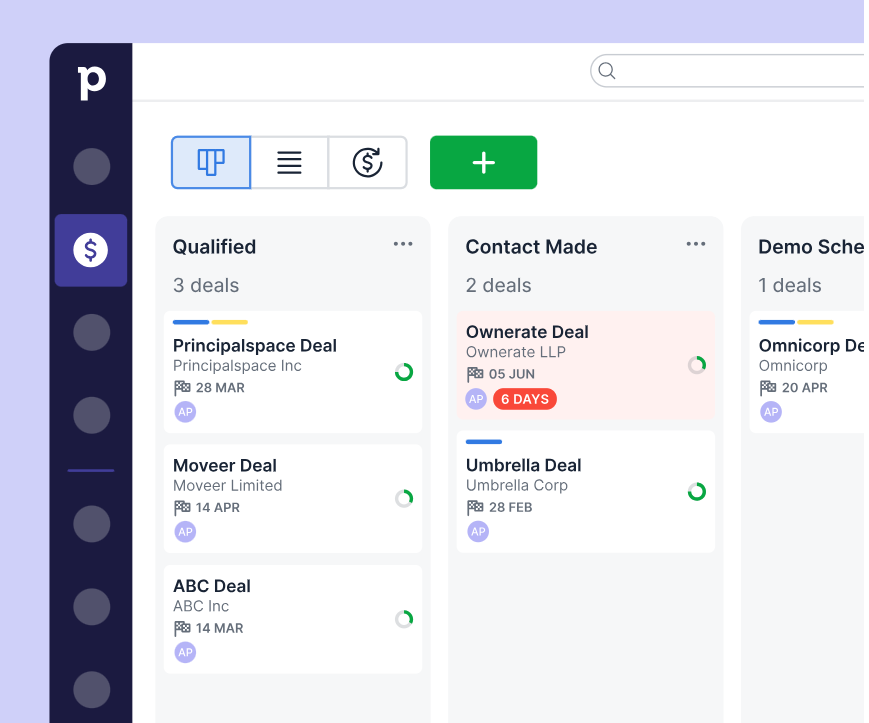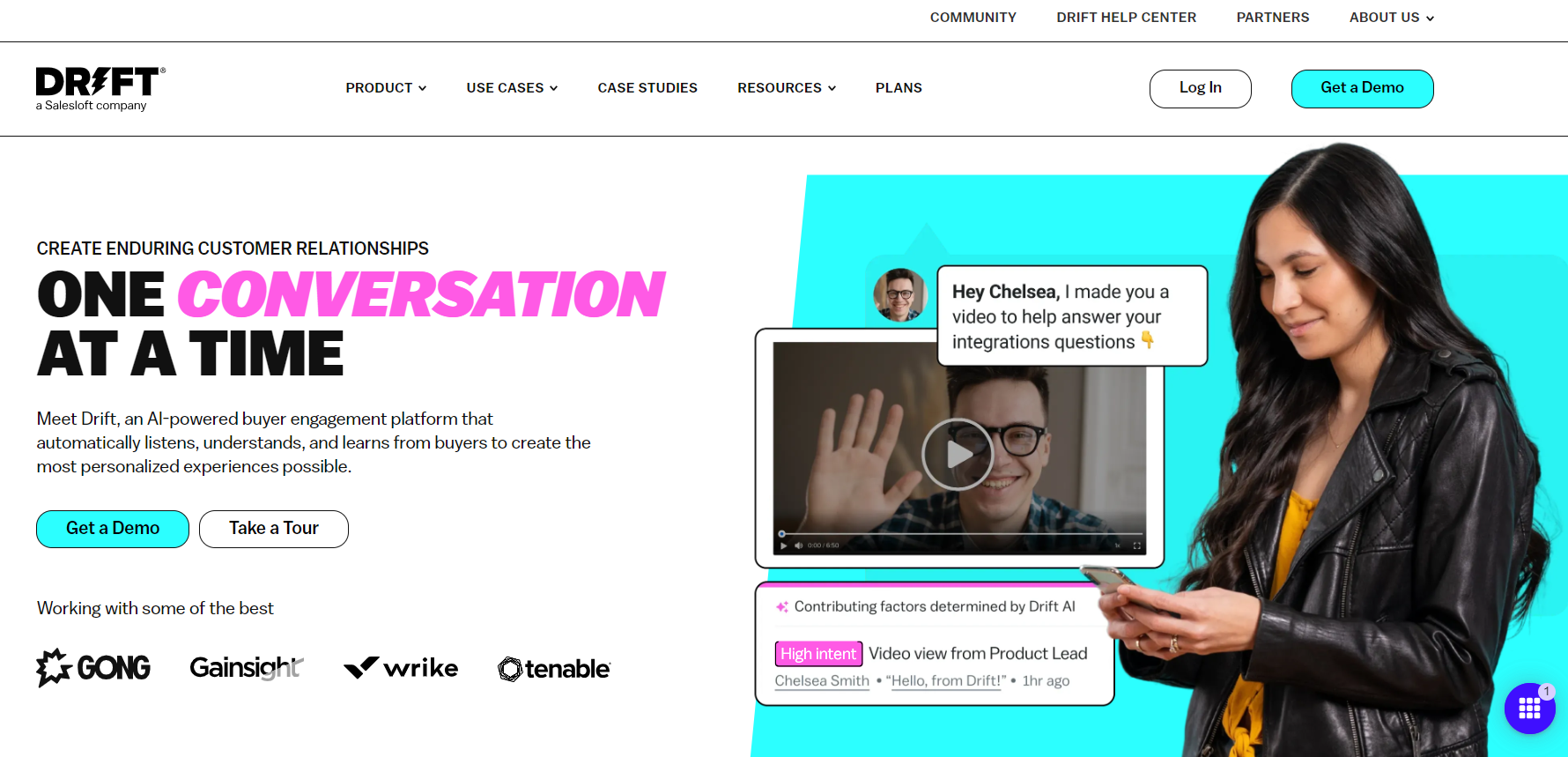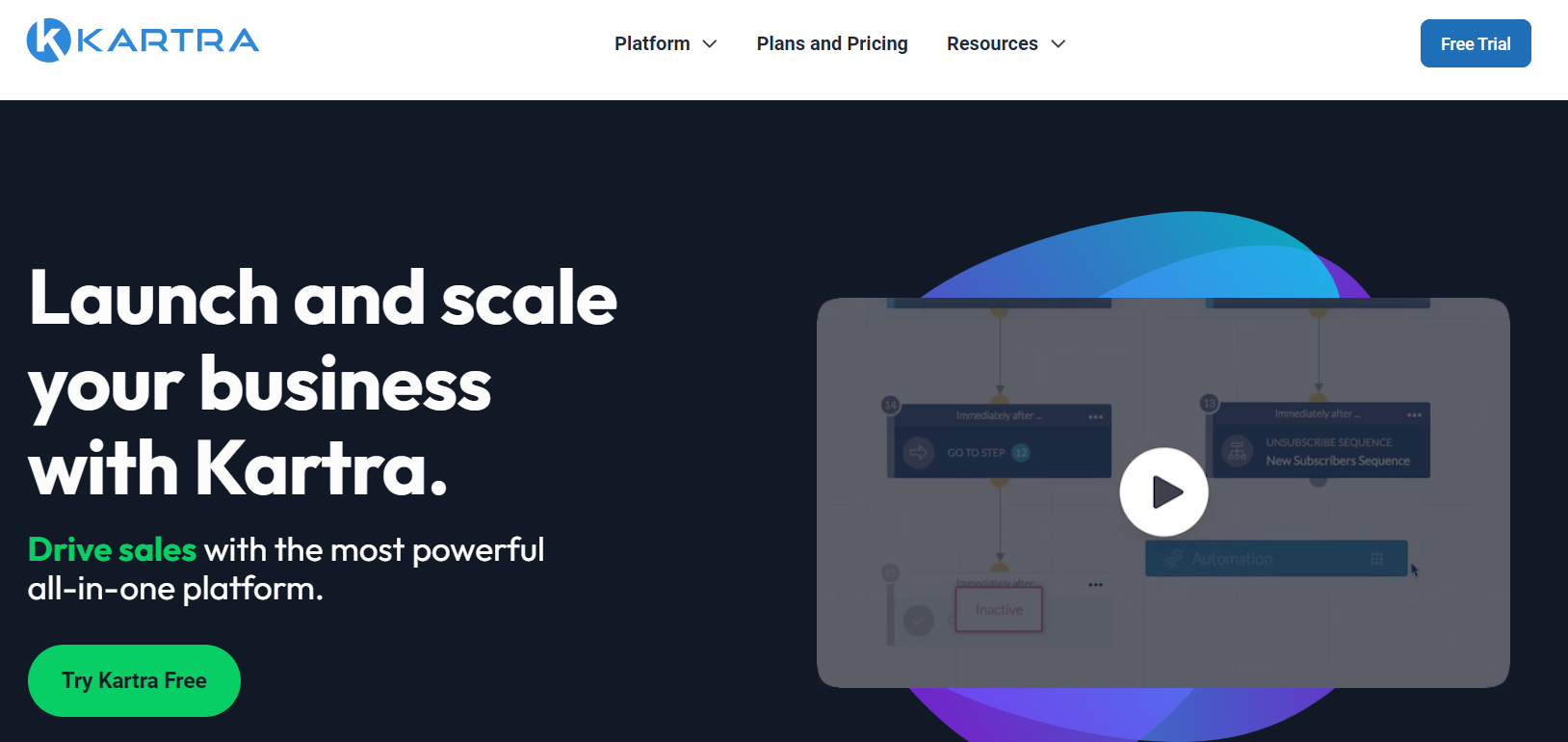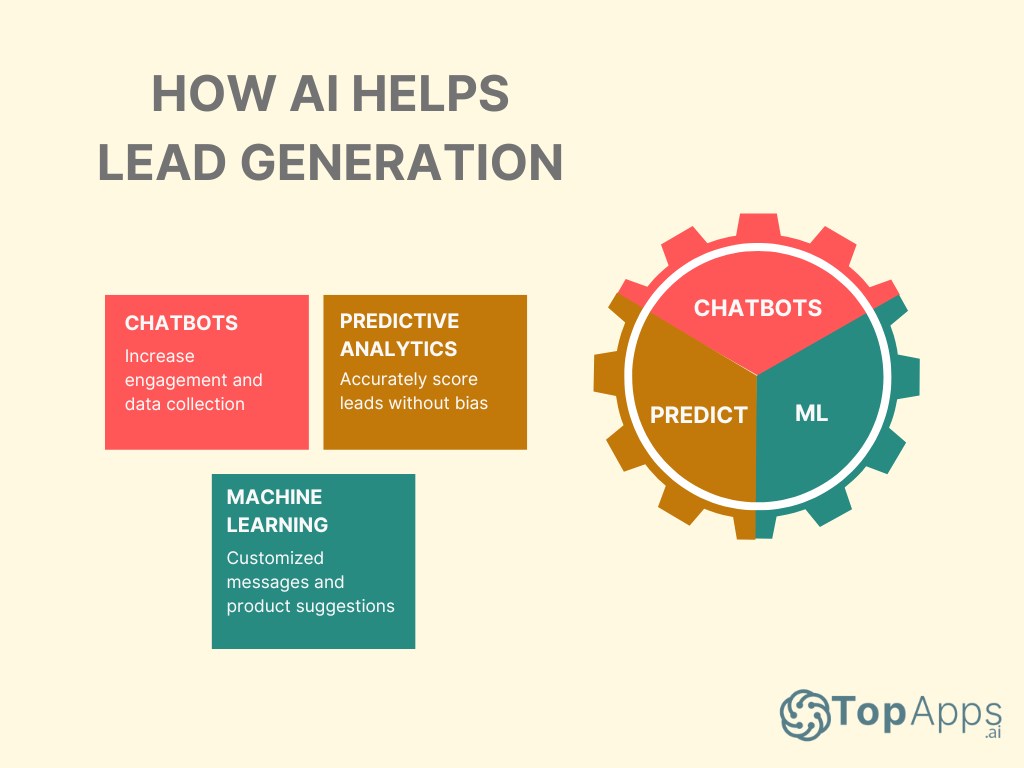Published on: March 12, 2024
Unlock the Potential of AI Lead Generation in 2024
Author: Amy Lancelotte

Businesses need to leverage artificial intelligence in sales and lead generation to stay competitive. By using AI-powered tools, companies can optimize their efforts and gain an edge over rivals. This blog post discusses the essential AI tools that are transforming lead generation along with successful case studies and future trends for optimizing your strategy even further.
Short summary
- AI-powered lead generation enables businesses to identify and engage with potential customers more efficiently.
- Essential AI tools such as chatbots, predictive analytics, and machine learning platforms are essential for successful lead generation.
- Businesses must invest in data quality, privacy measures, and cost-benefit analysis to successfully implement an AI-driven lead generation strategy.
The power of AI in lead generation

AI-powered lead generation is changing the way businesses connect with their prospective customers in a positive way. Companies that have adopted AI-based lead-generating software report up to a 20% improvement in sales productivity and 15% higher conversion rates for those efforts, according to LeadFuze. This is because these tools can automate important tasks, such as finding leads, analyzing them for potential value, forming customer profiles, and personalizing messages sent out on behalf of sales teams, all helping generate quality leads more efficiently than ever before.
Dell uses machine learning algorithms to better understand customers’ characteristics and buying habits so they know which prospects may be best suited for targeting based on similar preferences among existing buyers. Meet Alfred utilizes AI technology to craft custom LinkedIn outreach content, while CoPilot AI tests an innovative feature letting users quickly create personalized videos directed at LinkedIn contacts through the power of AI.
A major benefit seen from employing this type of technological advancement lies within its capacity to reduce costs associated with labor by taking over many tedious responsibilities previously managed manually. This frees up time to spend on engaging qualified leads instead of researching non productive ones.
Essential AI Tools for Effective Lead Generation
To maximize the efficiency of lead generation using AI, businesses need to utilize suitable tools. Machine learning platforms, predictive analytics, and chatbots can help streamline the process, enhance lead quality, and increase productivity all around.
Chatbots for engaging prospects
Chatbots have become a valuable resource in lead generation due to their ability to build relationships with prospects via conversations and provide individualized service. Companies such as Moosend, Vainu, and CoPilot AI are utilizing AI-based chatbot systems for conversing with people on LinkedIn or acquiring website visitor’s email addresses respectively. By using these automated technologies, businesses can save time spent qualifying leads while efficiently monitoring the customer journey.
Not only do bots support front-line efforts like bringing visitors up to speed about discounts and subscriptions, but they also assist enterprises in reducing abandonment rates by initiating dialogues directly from websites (like what Drift does). Taking advantage of this methodology assists firms looking to maximize their lead generation campaigns successfully.

We must apply an equilibrium between machine control and manual services when dealing with sales-related situations, especially those requiring more personalization. Hybrid strategies offer consumers both live chat options alongside automation tools designed through AI, which makes sure potential customers get exactly what they need without disrupting business operations too much at once.
Predictive analytics for scoring and prioritizing leads
Lead generation AI sales tools are heavily reliant on predictive analytics, utilizing machine learning such as classification, clustering, and regression to qualify leads with precision based on past trends in conversion rates.
AI-powered lead scoring also works to streamline the process by creating email lists from prospects’ details and sending out tailored messages. It can detect meaningful patterns via responses for accurate results that help sales teams prioritize opportunities most likely to convert. Data quality must be taken into consideration though, otherwise, marketing campaigns may fall short due to their lack of quantity or accuracy. Obtaining maximum returns requires a consistent upkeep of data standards which enables successful AI-driven lead generation outcomes.
Machine learning platforms for personalized marketing
By using AI-powered marketing tools, businesses can improve their lead-generation efforts and personalize the content delivered to leads based on browsing habits. Kartra is an example of this, with its automated rules designed for creating tailored messages and product suggestions. Striking a balance between using personalized marketing while protecting customer data must be achieved to establish strong relationships as well as foster machine learning platform advancements.

Achieving such privacy regulation goals through the effective use of these tools guarantees the safety of customers’ information from potential misuse or breaches, which helps create trust. According to McKinsey & Company, “Personalization drives performance and better customer outcomes. Companies that grow faster drive 40% more of their revenue from personalization than their slower-growing counterparts.” If that isn’t the kick you need to start employing a personalization strategy, what is?
Implementing AI in your lead generation strategy
In order to take full advantage of AI lead generation software when creating a strategy, it is necessary to become knowledgeable about the process. This involves market research, locating and qualifying prospects, and nurturing them until conversion. Becoming familiar with this will allow you to identify where AI-enabled solutions are most beneficial for your company. Consider which tools could be useful. Chatbots provide great engagement as well as data collection opportunities while predictive analytics can assist in scoring leads more accurately without bias. Using machine learning platforms aids in customizing messages and product suggestions based on customer information.
Before integrating any technology into existing procedures or systems, make sure they are compatible first. An investment may need to be made, but rewards down the line far outweigh the potential struggles initially experienced during the integration phase. By properly selecting and incorporating such products, you can not only benefit from improved lead generation strategies but also have a competitive edge.
Finally, always stay prepared that changes may need to be made if results do not prove satisfactory. Modifications should be considered continuously by using ROI metrics alongside other key indicators like tracking revenue growth or activity-related successes. Then, you can adjust your approach accordingly.
Case studies: AI lead generation success stories
Businesses have found success through the implementation of AI-powered lead-generation strategies. Take LinkedIn, Drift, and Outreach.io as an example – they’ve all employed AI tools to maximize their efforts in this area, leading to better sales productivity and higher yields from lead-gathering activities.
As discussed in the Harvard Business Review, a Harley Davidson dealership based in New York successfully used Adgorithms’ advanced AI tool to enhance its lead generation campaign, which resulted in a remarkable 2930% surge of potential customer inquiries. Something that really showcases the massive opportunity when it comes to utilizing artificial intelligence within marketing operations. This specialized application not only allowed finding targeted prospects but also created tailored messages with accurate precision towards those leads as well.

Smarsh implemented cutting-edge solutions coming from the Demandbase and Drift platforms to personalize their website content to match preferences identified by their consumer base. This resulted in improved interactions, which in turn, boosted conversions.
Outreach.io, another specialized AI-driven software that assists with the entire selling process offers users email templating options personalized or otherwise allowing companies to quickly contact plenty of prospecting contacts meanwhile saving time. These types of applications help streamline entire processes while improving overall quality.
Overcoming challenges in AI-powered lead generation

Lead generation tools that are AI-powered present a variety of benefits, yet they also come with some challenges. The primary issue is making sure the data used by the AI algorithms is comprehensive and accurate. Companies need to invest in quality control for their databases so results will be precise.
There can be privacy issues associated with this technology. Potential misuse of personal information, as well as breaches, all need to be safeguarded against through safety measures. It’s important to abide by all applicable regulations regarding data protection and stay transparent about how these technologies are being applied.
Cost might also factor into lead generation decisions. Investing upfront in maintaining datasets along with employing personnel who know how to use AI lead generation software effectively could carry an expensive price tag. If ROI objectives can take priority here, it should make up for costs down the line.
Measuring the ROI of AI-driven lead generation
When assessing the ROI of AI-driven lead generation tools, companies should monitor conversion rate, cost per lead, and customer lifetime value. Through this approach, they can gain insight into how effectively their AI technology is working and adjust strategies as needed to maximize return on investment.
Calculating tangible benefits from utilizing such AI-enabled solutions helps businesses make sure that investments in powerful technologies pay off over time. Reports show an increase between 15% to 20% in sales productivity plus improved order management throughput by up to 20%.
It’s crucial for firms implementing these technological advancements to identify precisely what issue they will be solving beforehand so returns are accurately predicted.

Future trends in AI lead generation
As AI technology advances, several trends are forming that will shape the future of lead generation. Natural language processing (NLP) is one such trend. This allows for more personalized interactions and engagement with potential customers as it enables algorithms to comprehend human speech better.
Voice search optimization also presents an opportunity. Using AI-powered tools in conjunction with voice-activated devices makes finding products and services a smoother process which aids businesses in their efforts towards generating leads.
Automated customer segmentation using machine learning algorithms provides accuracy by detecting consumer behavior patterns thus making sure quality leads come through from targeted campaigns.
Summary
To put it simply, businesses that take advantage of AI-powered lead generation tools are in a great position to increase their competitiveness and succeed. Through the use of popular methods such as chatbots, machine learning platforms, and predictive analytics, organizations can enhance their ability to generate leads for more efficient results.
Continuous development concerning artificial intelligence means companies must remain up-to-date on market trends so they don’t miss out on any new possibilities or breakthroughs. To make sure this happens, always assess which tools work best for you and track ROI accordingly. You’ll need to continually monitor and adjust the data and targets, but partnering with AI will allow your business’s engagement process concerning leads to be at an all-time high!
FAQs
Can I use AI to generate leads?
Using AI solutions, businesses can optimize their lead generation process and find high-quality leads. Chatbots, natural language processing technologies, and predictive analytics are just some of the tools available to help generate more effective prospects for your business. Lead generation is becoming easier than ever before due to advances in AI, which allow companies to uncover new opportunities for generating profitable leads quickly and efficiently.
How does AI help lead generation?
Lead generation is being modernized by AI, as it can automate tasks and bring about insight to allow more effective campaigns. Companies are using AI tools that collect customer data, spot potential leads, and develop them until they reach the point of conversion – streamlining the entire process from start to finish.
What is generative AI for lead generation?
Generative AI for lead generation is a powerful solution that helps businesses discover potential customers and develop customized advertising initiatives with exceptional accuracy. By combining information from consumers, current trends, online actions, and social media interactions, the technology allows companies to design more focused content that quickly speeds up the acquisition of leads.
What is AI-driven lead qualification?
Lead qualification powered by AI and Natural Language Processing (NLP), is a method to make the scoring and categorizing of leads more automated. By assessing lead behaviors and involvement levels, as well as intentions, this process can provide greater accuracy in qualifying prospects into clients for sales teams. This should lead to higher returns with an influx of qualified leads. AI-driven lead qualification ensures that all pertinent details are taken into account when it comes time to identify which potential customers have true promise.
Amy Lancelotte
TopApps writer
Recent Articles

Microsoft servers are down. Your business grinds to a halt. Panic sets in. Stop. Breathe. You’ve got this. This guide gives you 7...
Read More
As a business leader, you’re always searching for ways to stay ahead of the competition. What about AI in marketing and sales? In...
Read More
Struggling to keep up with the competition in 2025? You’re not alone. Small and medium enterprises (SMEs) are facing a rapidly evolving business...
Read More